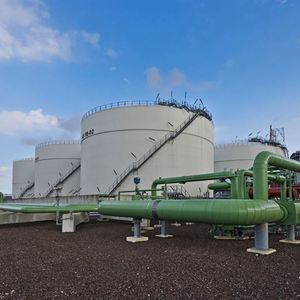Kinder Morgan, Neste partner on renewable fuels logistics project

SOURCE: Neste
September 15, 2021
BY Neste
Kinder Morgan Inc., one of North America's largest energy infrastructure companies, is partnering with Neste, one of the leading providers of renewable and circular solutions, to create a premier domestic raw material storage and logistics hub in the United States, supporting increased production of renewable diesel, sustainable aviation fuel and renewable feedstock for polymers and chemicals. Upon completion of the project, Kinder Morgan's Harvey, Louisiana, facility will serve as the primary hub where Neste will store a variety of raw materials including, for example, the used cooking oil it collects from more than 40,000 restaurants across the United States.
As part of the initial, committed phases of the project, Kinder Morgan will modify existing tanks and piping to enable segregated storage for a variety of raw material across 30 tanks. The scope of work also includes the installation of a new boiler for heating tanks and railcars and infrastructure improvements for rail, truck and marine movements. The project, which is supported by a long-term commercial commitment from Neste, is expected to commence operations in the first quarter of 2023. At Neste's option, the facility can be further expanded.
"This clearly shows the positive role America's existing energy infrastructure can play in creating a sustainable future and fighting climate change," says Jeremy Baines, president of Neste U.S. "Neste and Kinder Morgan are transforming existing terminal assets into what can be considered green infrastructure, which will ultimately enable more American businesses and cities to power their fleets and supply chains with renewable fuels and other products."
The commitment is one of Neste's largest to date in the U.S., supporting a more resilient, flexible and sustainable supply chain that can keep pace with the company's growing production capacity and increasing global demand for lower-emission products. It enhances Neste's leading position, building on the company's more than 15-year head start in creating an end-to-end renewable product value chain.
Advertisement
Advertisement
In the long term, the project could also help improve the lifecycle climate benefits and competitiveness of Neste's renewable products through more efficient and less carbon intensive supply chain operations. Renewable fuels offer an immediate way to reduce greenhouse gas emissions from aviation and heavy duty road transport in the US. Neste's renewable feedstock for polymers and chemicals manufacturing can also significantly reduce the carbon footprint of the end products.
In fact, Neste's renewable products prevented over 40 million tons of new GHG emissions from entering the atmosphere over the last five years - the same climate benefits as building 8,300 wind turbines or making 10.8 million cars zero emission according to the U.S. EPA's GHG calculator.
Kinder Morgan is a trusted partner for Neste, with a strong history of collaboration between the two companies. In 2020, Neste began supplying sustainable aviation fuel (SAF) directly to San Francisco International (SFO) airport via a Kinder Morgan pipeline. More than 1 million gallons of SAF have been supplied into SFO to date.
Advertisement
Advertisement
With this project, Kinder Morgan is further demonstrating its commitment to offer low-carbon infrastructure solutions to the country's fast growing renewable fuels industry.
"We are thrilled to partner with Neste, a global leader in renewable fuels, on this important logistics project. As North America's largest terminal operator with existing infrastructure including 80 million barrels of storage, 266 docks, 462 truck bays and 6,800 rail car spots, Kinder Morgan Terminals is uniquely positioned to play a leading role in the transition to renewable fuels," said John Schlosser, president of Kinder Morgan Terminals.
Because renewable products work with existing energy infrastructure, the U.S.'s vast network of pipelines, storage tanks, and distribution sites can be used to rapidly scale their availability. This is a major advantage, enabling renewable products to replace fossil products faster and more affordably.
Related Stories
Bangkok Airways Public Company Limited has officially announced the adoption of sustainable aviation fuel (SAF) on its commercial flights, reinforcing Thailand’s green aviation industry. The initiative took effect starting July 1, 2025.
Avalon Energy Group LLC and Sulzer Chemtech have signed a strategic alliance and partnership agreement to scale up the production of SAF. Under the agreement, Avalon has selected BioFlux technology for its portfolio of SAF projects.
Neste and DHL Express have strengthened their collaboration with the supply of 7,400 tons (9.5 million liters) of neat, i.e. unblended, Neste MY Sustainable Aviation Fuel to DHL Express at Singapore Changi Airport starting July 2025.
CoBank’s latest quarterly research report, released July 10, highlights current uncertainty around the implementation of three biofuel policies, RFS RVOs, small refinery exemptions (SREs) and the 45Z clean fuels production tax credit.
The USDA significantly increased its estimate for 2025-’26 soybean oil use in biofuel production in its latest World Agricultural Supply and Demand Estimates report, released July 11. The outlook for soybean production was revised down.
Upcoming Events










